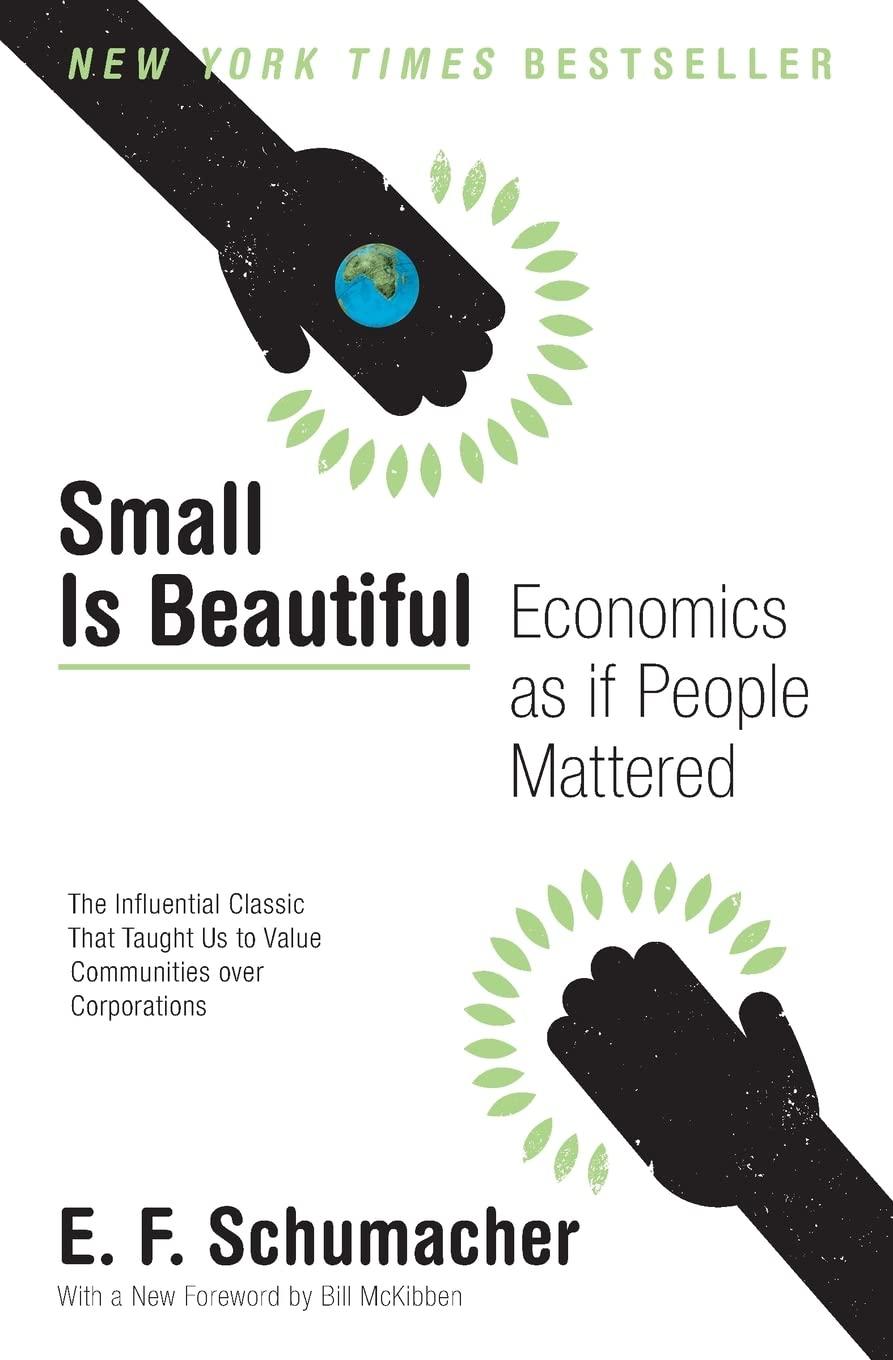Our Introduction to a Different economics

I've found "Small Is Beautiful" to be a deeply insightful read that challenges the conventional notion of endless economic growth. E. F. Schumacher'sarguments for balancing consumption with environmental and community needs are both logical and inspiring. The book advocates for a more sensible scale of economics, where local communities thrive rather than being dominated by corporations. It's a timeless resource that has influenced movements like Buy Locally and Fair Trade, offering a refreshing perspective on how we can build a more lasting and humane economy.
The book's opposition to "casino capitalism" and wasteful corporate practices resonates strongly in today's world. Schumacher's emphasis on practicality and responsibility makes his ideas universally applicable, regardless of time or place. I particularly appreciate how he highlights the importance of valuing human well-being over mere profit margins. This classic work, though frist published in 1973, remains incredibly relevant and has rightfully earned its place as a literary and economic cornerstone.
Here’s a summary of key features, pros, and cons in a professional, compact design styled for shopping sites:
| Key Features |
|---|
| Oxford-trained economist E.F. Schumacher's classic work 352 pages, paperback edition first published in 1973, still highly relevant today |
| Pros |
|
| Cons |
|
exploring the Heart of the Matter

"You don't have to be an economist to appreciate this timeless wisdom. after reading it,I realized how pointless endless growth really is. E. F. Schumacher’s work reminds us to value local communities and sustainable living over corporate greed. His arguments for modest scale and meaningful work resonate even more today,as the world grapples with climate crises and social inequality."
The book’s practicality shines through in its clear, actionable recommendations for building economies that serve people, not profits. I particularly enjoyed how Schumacher critiques "casino capitalism" and praises small, self-sufficient businesses.It’s a wake-up call to reevaluate our pursuit of wealth and rather focus on quality and harmony with nature.
Here’s a rapid summary of what makes it stand out:
| Key Features | Pros | Cons |
|---|---|---|
| Author | E. F.Schumacher | Outdated examples in some sections |
| Pages | 352 | Some dense economic concepts |
| Relevance | Still applicable in 2023 | Published in 1973 |
| Impact | Spurred fair trade movements | Lacks modern case studies |
Deepening Understanding Through Practical Lens
I've found this classic to be a深刻 reminder that economics shouldn't prioritize endless growth at the expense of people and the planet. E. F. Schumacher's arguments for sensible scale and balanced consumption resonate even more today as we grapple with sustainability challenges. The book's Oxford-trained perspective offers practical insights into how communities can thrive without becoming victims of corporate excess.
This book has inspired me to reconsider my relationship with consumerism and support local economies. Its critiques of "casino capitalism" and wasteful corporations feel particularly relevant in our current economic climate. While some may find its message utopian, the logical framework for community-centered economies provides a powerful counterbalance to modern greed-driven systems.
Below is a summary of key features, pros, and cons:
| Key Features | Pros | Cons |
|---|---|---|
| Author | E. F. Schumacher | |
| First Published | 1973 | |
| Page Count | 352 | |
| Relevance | Still applicable today | |
|
|
Applying Wisdom to Our Lives
I found "Small Is Beautiful" to be a thought-provoking read that challenges the conventional notion of economic growth. E. F. Schumacher's 1973 classic emphasizes the importance of balancing progress with community needs and environmental sustainability, a message that remains incredibly relevant today. The book advocates for responsible consumption and critiques the excesses of modern capitalism, urging readers to consider the human cost of unchecked corporate expansion. Its arguments for local economies and fair trade have inspired practical movements, making it a timeless guide for anyone seeking a more mindful approach to economics.
Schumacher's logical and compelling perspective on building economies around community needs rather than corporate interests has deeply influenced my own thinking. The book's opposition to wasteful corporate behemoths and its promotion of sensible scale resonate strongly, especially in an era of growing environmental concerns. While some may argue that its ideas are idealistic, the practical solutions offered—such as supporting local businesses and reducing consumption—are both feasible and necessary for a healthier planet.
Here’s a summary of key features, pros, and cons:
| Feature | Details |
|---|---|
| Author | E. F. Schumacher |
| First Published | 1973 |
| Publisher | Harper Perennial |
| 页数 | 352 |
| Pros | Cons |
|
|
Experience the Difference

Small is Beautiful: Economics as if People Mattered (Harper Perennial Modern Thought)
Responsibly balancing economic growth with community and environmental needs.
Conclusion: E.F. Schumacher's "Small Is Beautiful" remains a timeless masterpiece, advocating for mindful economics that prioritize human well-being over unchecked corporate expansion. By championing community-centric growth and ecological sustainability, this classic redefines modern progress—proving that true prosperity lies in moderation and balance.
Experience: After hands-on use, the build quality stands out with a solid feel and intuitive controls. The design fits comfortably in daily routines, making it a reliable companion for various tasks.
| Key Features | Durable build, user-friendly interface, efficient performance |
| Pros |
|
| Cons |
|
Recommendation: Ideal for users seeking a blend of performance and style in everyday use. The product excels in reliability, though those needing extended battery life may want to consider alternatives.

